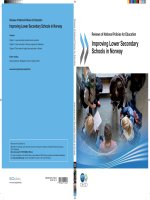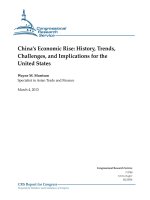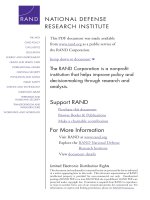Reform of the history of state and law module under the context of the internationalization of law and legal education
Bạn đang xem bản rút gọn của tài liệu. Xem và tải ngay bản đầy đủ của tài liệu tại đây (306.1 KB, 6 trang )
<span class='text_page_counter'>(1)</span><div class='page_container' data-page=1>
<b>REFORM OF THE HISTORY OF STATE AND LAW MODULE UNDER </b>
<b>THE CONTEXT OF THE INTERNATIONALIZATION OF LAW AND </b>
<b>LEGAL EDUCATION </b>
<i><b>Nguyen Minh Tuan</b></i>
<i>It is clear to confirm that history of state and law plays an important role in our legal </i>
<i>training program. Otherwise it is worth to discuss how we react to this subject, if it is suitable </i>
<i>and how to promote the position of this module, how to make this module really necessary to </i>
<i>the students under the context of the internationalization of law and legal education. The </i>
<i>following article introduces the author's views about this issue. </i>
<b>1. Where to start before the trend of the Internationalization of law and legal </b>
<b>education? Firstly from the reform of teaching, learning and evaluation </b>
<i><b>1.1. It is really necessary to stop the assessment requiring the students to learn by </b></i>
<i><b>heart the lessons </b></i>
Jan Klabbers and Mortimer Sellers indicate that the internationalization of law and of
legal education are the inevitable result of changes in technology and communication that
make global contacts and cooperation more possible. Like most cultural changes, these
developments may have negative as well as positive implications. Law can be narrow and
parochial, while universities from their inception have been attractive to foreigners and
oriented towards the wider world.642
In the age of industry 4.0, the development of science and technology has changed our
lives. Requiring the students to remember so much information in detail is really out of date.
<i>What we should do to train the students is that we should create ―a smart head", not </i>
<i>"a head full of information, but incapable of analyzing, handling and applying‖. Therefore, it </i>
is necessary to stop the teaching method, that requires the students to copy and to memorize
all information and then answer what the teacher has taught in class for his/her examinations.
<i><b>1.2. We need to stop teaching so much </b></i>
As the aims of law should be justice and the common good, so the aims of the university
should be truth and freedom of thought. These shared values animate the universities and should
guide the study of law.643
For a long time, the teaching of this module concentrate on only the knowledge, but I
personally think that the capacity is much more important than the knowledge. We can
<i>consider knowledge as "building materials", and capacity as "the ability to build a house". If </i>
you have building materials and do not know how to build a house, it is not beneficial.
I myself think that the teacher should require the students to master the typical events
in the past as well as the most fundamental issues of each historical period only. The students
Assoc. Prof. Dr., School of law, Vietnam National University Hanoi
642<i><sub> Jan Klabbers, Mortimer Sellers, The Internationalization of law and legal education, Springer, 2008, p. 4. </sub></i>
643
</div>
<span class='text_page_counter'>(2)</span><div class='page_container' data-page=2>
should acknowledge that ―less is more‖. They should master the knowledge and develop them
according to their own understanding. In addition, they should not pay much attention to the
knowledge of history of state and law, not that of historical science. It is also necessary to
avoid providing so many events, dates or requiring the students to memorize all of them.
<i><b>1.3. It is better to encourage the students to be creative, critical and curious to learn </b></i>
<i><b>history of state and law </b></i>
How to make the lectures of history of state and law interesting is an important
mission. The teaching history of state and law will be disappointed and bored if what they
were taught can not be directly related to what he or she later does in practice.About
combining theory and practice, Gerald F. Hess also discusses that experiential learning
combines academic inquiry with real-life experiences. Students can have real-life experiences
with law outside the classroom in courts, agencies, and law offices. Teachers can arrange for
students to encounter real life in the classroom through newspapers, videos, actual legal
documents, and speakers. For effective experiential learning to occur, simply offering
students the experiences is not enough. Students must engage in an accompanying reflective
process in which they glean meaning and lessons from the experiences. Experiential learning
includes two elements-real-life experiences and reflection. They include clinics, externships,
service learning, field trips, real life in class, collaborative learning exercises. 644
The interaction beween the teachers and the students is very important. The students
should have chances to express their own ideas and the teachers should encourage them to do that.
In addition, the students have the right to doubt, criticize and express their ideas or
combine and compare the events in the past and in the present.
Lecturers should not only focus on providing knowledge, but also aim at enhancing
the capacity of critical thinking, recognizing new ideas, reasoning before studying other
specific modules in the legal training program.
<i>Gerald F. Hess has highly appreciated the effectiveness of the discussions. He pointed out </i>
that: In law school, the core of student learning includes the substantive content, skills, and
professional values critical to the education of an effective, ethical attorney. He explains good
discussions can be of great value to the learning process. Discussion helps students to retain
information at the end of the course, to develop problem-solving and thinking skills, to change
attitudes, and to motivate additional learning about a subject. In addition, discussion gives teachers
feedback and ideas from their students. 645 Saying another way, discussion and questioning are
teaching techniques aimed at eliciting student participation. The techniques feature two-way spoken
communication between students and teacher and direct interaction among the students themselves.
When using these techniques, teacher and students consider a topic, problem, or issue and exchange
information, experiences, ideas, opinions, reactions, or conclusions.646
644
Gerald F. Hess, Steven Friedland, Techniques for Teaching Law, Carolina Academic Press, 1999, p. 57.
645<sub> Gerald F. Hess, Steven Friedland, Techniques for Teaching Law, Carolina Academic Press, 1999, p. 3, p. 55. </sub>
646
</div>
<span class='text_page_counter'>(3)</span><div class='page_container' data-page=3>
<i><b>1.4. Redesigning the forms of teaching and creating appropriate teaching methods, </b></i>
<i><b>changing from passive to active model </b></i>
Teaching History of state and law is not an easy work. It is an art. Therefore it is
necessary to discuss and to practice more in this module. The teachers can divide the class into
groups. Each one should discuss about a topic that the teachers provide. By discussing the
teachers and the students can share their knowledge and ideas from many different aspects.
―Change by exchange‖ is the best way to develop the capacity and skills of the students.
The more the students participate in collective activities, the more they will be
self-confident and know how to get and master more knowledge from the others and from many
sources. In the industry 4.0, some necessary criteria of modern lawyers are practical, active and
creative. That is the reason why it is necessary to develop the capacity of self-learning and the
capacity of applying the knowledge of this module about history of state and law to practice.
<i>The students should even be regarded as "historical actors", or "history makers" to </i>
discover new historical knowledge.
Today, new skills are required in legal education as exemplified by the development
of practical and experiential training methodologies. It exists currently a trend that there are
plenty of clinical programs, moot court competitions, study-abroad courses, debate clubs, and
an increased reliance on non-legal disciplines such as economics, psychology, political
science, anthropology, and sociology. Today‘s law school graduates must have the skills to
play the role of facilitators and problem solvers in international transactions. They must also
be able to act as liaisons between and among formally organized legal systems with differing
national histories, customs, and experiences.647
What is of particular concern here is the type of cognitive skills that students need to
acquire if they are to operate effectively as historians, such as critically analyzing secondary
historical literature and evaluating the reliability of historical evidence. Such skills no doubt
have applicability beyond the academy, especially in the world of work, albeit for the great
majority of students in nonhistorical contexts. 648
<i><b>1.5. Change of assessment criteria: Exams to test competence </b></i>
<i>I totally agree with the opinions of two authors Keith C. Barton and Linda S. Levstik </i>
in the book teaching History for the Common Good that students are expected to identify:
They are asked to embrace connections between themselves and the people and events of the
past. Second, students are expected to analyze: They are asked to establish causal linkages in
history. Third, students are expected to respond morally: They are asked to remember, admire,
and condemn people and events in the past. Finally, students are expected to display: They are
asked to exhibit information about the past.649
647 Jan Klabbers, Mortimer Sellers, The Internationalization of law and legal education, Springer, 2008, p. 30.
648 Bhuvan Garg, Teaching of History, Rajat Publications, New Delhi, 2007, p.257.
</div>
<span class='text_page_counter'>(4)</span><div class='page_container' data-page=4>
I think that the requirements in the examinations should not test the knowledge, but
the competencies (approaching the issues, analyzing, synthesizing and solving the problems).
The teaching activities must be changed to satisfy the requirements of the exams for
developing the competency. The most important thing in studying history of law is to
understand the rules affecting it. Therefore it is very necessary to change our mind from
―learning to pass the examinations‖ to ―testing to learn more‖.
The contents of the exams should be more interesting and practical. As I mentioned
above, it is necessary to renew our thinking, so that the students should become "historical
actors" or "history makers" to explore historical knowledge. It means the content of the exams
should not be merely the requirement about knowledge, it should be combined with the
testing about the competences of understanding, analyzing, synthesizing and solving the
problems. For examples, the question may be about the requirement of analyzing a problem of
state and law in the past and the ideas of the students if it happens in the future.
<b>2. Changing our behavior to students: They are considered as customers </b>
Today, students have the right to choose modules. Otherwise they have the right to
choose lecturers and to assess the quality of lectures. It is no longer the time when teachers
are always right or the teachers are the ones who deliver the knowledge. The source of
information was in the past only from the teachers. Now it has changed rapidly, the students
can get knowledge from many other sources.
The slogan "Students are regarded as center" does not mean that the role of the
teachers is not important anymore, but in the fact the requirement for the teachers must be
higher to sastify the demands of the society. They must have the abilities of organizing,
orienting all activities of the students and assist them to study best.
Students have now more chances to access to many sources of information, a plenty of
materials. Especially if they are hard-working and have good foreign language ability, they can
access and even know much more information than the teachers. If the lecturers don‘t work hard
and update knowledge, they will easily be outdated in his own professional problem.
Teachers need to be constantly trained and practiced, fully equipped with teaching
facilities and conditions so that they can ensure to implement the teaching activities.
To be suitable to the trend of innovation today, the teachers are not the persons who
impose the knowledge. They are the ones who help the students to learn how to learn by
themselves, how to approach and solve legal problems, how to analyze and synthesize the
knowledge. The teachers must take care of their students as customers and therefore pay
attention to the quality of lectures to sastify the demands of the students.
<b>3. Acceptance of the equal competition to other modules: by self-renewal </b>
</div>
<span class='text_page_counter'>(5)</span><div class='page_container' data-page=5>
other modules. First of all we should change the teaching content. Secondly, we should
devide this module into many concrete parts suitable to demands of different students. We
should design the model of different issues, but there is no change of the nature of the
historical structure.
For example, the students will study the optical historical issues suitable to their study
goals like history of public law, international law, business law, criminal law, civil law
etc…We can design the program with the general and particular parts. The general part
includes the knowledge relating to the fundamental issues of legal history, and the particular
one relating to the specific issues directly serving the concrete demands of students according
to their studying fields. The teachers must changr not only the teaching content, but also the
teaching methods and methods of testing and evaluating modules.
<b>4. Mobilization of the support of the training institution: by quality, innovation </b>
<b>and increace the practical character of this module </b>
History of State and law is an obligatory module in the credit training programs for
legal students at the School of Law, Vietnam National University Hanoi, including law,
business law, and other new legal disciplines).
In fact, leaders of legal training units like School of law are not only facing to the
competitive pressure between training institutions, but also the demand of lengthening the
specialized modules.
The duration of teaching History of state and law is now in danger of reducing to
increase the duration for specialized modules and modules of skills.
I myself think that all lecturers have to convince the training units and even fight for
the maintenance of the History of state and law module in legal training institutions.
School of law and other Universities of law are academic, not vocational training
institutions. Goal of training at the University level is academic. If the module ―History of
state of law‖ is deleted, the students – the young generation of our country – will be at
risk of forgetting history of the nation and their origins. Therefore they will surely not
understand anything about the origin of the law before studying other modules. Students
will only grasp ―the top‖, but not ―the root‖. Once the roots are not stable, the tops will be
also difficult to sustain. If history of state and law is not considered as an important part
of training program, it is definitely in my opinion a serious mistake and nothing c an be
fixed or corrected for the future.
</div>
<span class='text_page_counter'>(6)</span><div class='page_container' data-page=6>
<b>5. Spreading the spirit, meaningfulness, importance of history of state and law to </b>
<b>students and society </b>
In order to spread the spirit of this module, it is necessary to connect the knowledge to
the praxis in this module. It is necessary to diversify types of practice for students to experience,
through various forms of education such as group / individual activities, self-study, field work,
study through the project, participating in projects, visiting heritage and museum ...
The history of the state and law module promotes the positive affect to society when it
is re-considered that: this is a module which not only equips students with knowledge, but
also focuses on training the ability to solve problems associating with situations of life, and
promotes the ability of applying historical experiences into practice as well. It is important for
the students to understand that: History of state and law has a close connection to the present.
In order to find solutions to the current legal issues, it is extremely necessary to learn lessons
from the past to understand the values, the rules from the past.
Finally without the change of evaluation method the renovation is not successful.
The students must have the right to evaluate the necessity of this module, not the the
lecturers or the training institutions. There is no reason to delete a module that is highly
evaluated and appreciated by learners. In opposition to that, they should focus on developing
and investing in it.
In conclusion, It is necessary to have a long-term strategy for the renovation of the
history of state and the law module and determination from the faculty members of law
training institutions. It is necessary to innovate the way of teaching, learning and evaluating
towards capacity building; changing behaviors with learners, considering learners as
customers; accept competition with other modules by self-renewal; mobilize and enlist the
support of training institutions and spread the spirit, meaning, importance of state history and
law to learners and society.
<b>REFERENCES </b>
1. <i>Bhuvan Garg, Teaching of History, Rajat Publications, New Delhi, 2007. </i>
2. <i>Jan Klabbers, Mortimer Sellers, The Internationalization of law and legal education, </i>
Springer, 2008
3. <i>Gerald F. Hess, Steven Friedland, Techniques for Teaching Law, Carolina Academic </i>
Press, 1999.
</div>
<!--links-->









